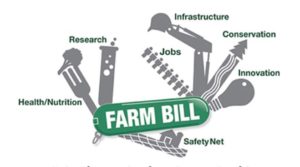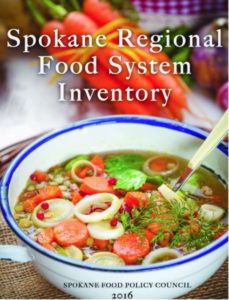Written By: Linda Moulder
 Begun after the Dust Bowl and Depression years of the 1930s, Congress developed a complex set of safety nets for food, fiber, fuel and energy and named it the Farm Bill. $100 billion is allotted annually to support Farm Bill programs. Federal policies are complicated and the Farm Bill is no exception. It aims to care for our lands, economic uncertainty and hungry children. As legislators begin their bargaining process to reauthorize the next Farm Bill in Fall, 2018, programs will shift along with allotment of money. The food and agriculture industry is the most heavily lobbied industry in Washington with more than 1200 lobbyists. Grassroots efforts are essential to assure a balanced Farm Bill.
Begun after the Dust Bowl and Depression years of the 1930s, Congress developed a complex set of safety nets for food, fiber, fuel and energy and named it the Farm Bill. $100 billion is allotted annually to support Farm Bill programs. Federal policies are complicated and the Farm Bill is no exception. It aims to care for our lands, economic uncertainty and hungry children. As legislators begin their bargaining process to reauthorize the next Farm Bill in Fall, 2018, programs will shift along with allotment of money. The food and agriculture industry is the most heavily lobbied industry in Washington with more than 1200 lobbyists. Grassroots efforts are essential to assure a balanced Farm Bill.
Farm Bill Programs are called “Titles”. Titles range from funds for food stamps to huge subsidies for internationally traded commodities, crop insurance, education, support of more sustainable practices and research. The largest Titles include Nutrition, Commodity and Conservation programs.
Title 4: Nutrition
Nutrition programs for those in need make up the largest part of the bill. A whopping 79% of the annual Farm Bill budget pays for what used to be called Food Stamps, nutritional supplements that are now called SNAP (Supplemental Nutrition Assistance Program). Forty–six million Americans quality for food stamps and electronic cards are issued to those who qualify. The ongoing challenge for legislators is wrestling with what rules should apply. Retailers who accept SNAP benefits must offer healthy options. Should those options include a soda filled with sugar or a bag of salty and processed ingredients? What rules fairly encourage the low income consumer to buy fresh, healthy foods, instead of sodas or chips?
In response to a cry for healthier foods for those in need and to provide a more direct market, Double Up Food Bucks tokens were developed to be used at farmer’s markets. SNAP participants are encouraged to purchase more fruits and vegetables at Farmer’s Markets during prime growing season and as the name implies the tokens buy twice the value of the fresh fruit or vegetables. This has been beneficial for farmers and SNAP buyers.
Title 1: Commodities
Commodity subsidies represent 6% of Farm Bill expenditures. These are the large production crops that are traded internationally like corn, soybeans, wheat, rice, dairy and sugar. They are generally non-perishable and store well. These are a driving force behind passage of the Farm Bill. Direct payments are made to farmers when market conditions fall or annual yields create a loss. Many of Eastern Washington crops, including wheat, peas, lentils, and apples are sold as commodities.
Title 2: Conservation
Conservation measures represent another 6% of the Farm Bill budget. Various conservation programs spearhead watershed protection, encourage field buffers for birds, pollinators and wildlife and educate farmers about good farming practices and programs. Financial incentives encourage the planting of cover crops to reduce soil erosion and nutrient loss. These measures are particularly essential on conventional farms that use toxic chemicals. They often farm to the edge of their properties without protective buffers that allow for wildlife to move freely and safely from water supply to cover. The runoff is more polluted and the sediment load to streams from erosion is a concern. Many of these programs are slated to be cut in the new Farm Bill. Grass root efforts will be necessary to assure these vital programs continue to protect the land that grows our food.
This website (http://sustainableagriculture.net/our-work/) is a great primer about the Farm Bill and relevant issues.
Adapted from an article in ConWatch, The Garden Club of America, Fall, 2017, written by Missy Janes.


